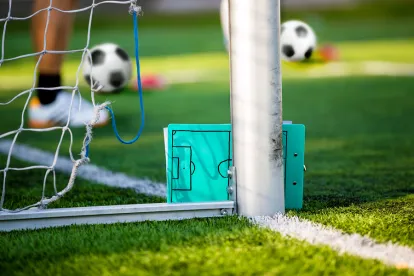With only the FIFA World Cup play-off matches left to play, we are now close to knowing the final line up of teams that will appear in Russia in 2018.
The final round of group qualification matches led to drama around the world. While Ireland’s 1-0 defeat of Wales meant that the Irish would qualify for the play-offs, by the same stroke it consigned the Welsh to another summer spent watching the World Cup from home.
Yet the drama in the Wales v Ireland match did not compare to the scenes in Egypt, where an injury time penalty secured the Egyptians’ place in Russia and prompted wild celebrations among the Pharoahs’ fans.
The qualification story in South America also proved intriguing. It has been reported that Colombia striker Radamel Falcao admitted discussing playing for a draw with his Peruvian opponents in Colombia’s 1-1 draw with Peru, a result which saw both sides progress in World Cup qualifying. This alleged behaviour led to suggestions in the press of match-fixing.
With results elsewhere going in their favour, Colombia knew that a draw with Peru would mean that they would finish fourth in their qualifying group and that they would therefore qualify automatically for the World Cup. That result would also mean that Peru would qualify for a play-off against New Zealand, after finishing fifth in the group. If either side had lost the match, Chile would have overtaken them to secure a place in Russia.
As the match between Colombia and Peru neared its end, footage appeared to show Falcao energetically speaking to a number of his opponents, with his hand covering his mouth. It is of course impossible to know what was said by the players, but some reports noted that the two teams appeared then to slow the pace of the game.
The game finished in a draw, with Colombia qualifying for the World Cup automatically and Peru making the play-off match against New Zealand. Chile finished sixth in the qualifying group meaning that the stars of the 2010 and 2014 World Cups would not be in attendance in Russia.
After the game, Falcao reportedly denied any impropriety:
“We knew what was happening in the other matches, we were playing with [the knowledge of] the other results and in that moment [I tried] to transmit that [to Peru]. Nothing more. I think Peru has been a worthy rival, they fought for 90 minutes just like us. The match was very tight. We suffered a lot but in the end we did it.”
When asked about the matter, Peru midfield Renato Tapia was reported to have stated as follows:
“In the last five minutes, the Colombians approached us. They knew what the situation was in the other games. So we managed the game as we needed to… I spoke with Radamel, who told me were both qualified [as things stood]… It’s football and we play to win.”
The Peru coach, Nolberto Solano, was reported to have stated that:
“We need to win, them too. What pact? That’s speculation. Obviously, at the end, we knew what the other results were and you tell yourself, ‘Calm it down a bit, we mustn’t take any risks.”
It is not the first time that it has been reported that some form of ‘pact’ has been reached between teams. In the 1982 World Cup, West Germany played Austria in the last game of the first round, with Algeria and Chile having played the day before. With the outcome of the Algeria v Chile match known to the Germans and Austrians, both teams could be sure that a win by one or two goals for West Germany would result in both sides qualifying at the expense of Algeria. West Germany took the lead in the tenth minute and, thereafter, there appeared to be very few attempts by either side to score. While some observers accused the sides of match-fixing, FIFA ruled that neither team broke any rules. This did not stop the match becoming known as the Disgrace of Gijón.
Article 69 of the FIFA Disciplinary Code states that:
“1. Anyone who conspires to influence the result of a match in a manner contrary to sporting ethics shall be sanctioned with a match suspension or a ban on taking part in any football-related activity as well as a fine of at least CHF 15,000. In serious cases, a lifetime ban on taking part in any football-related activity shall be imposed.
2. In the case of a player or official unlawfully influencing the result of a match in accordance with par. 1, the club or association to which the player or official belongs may be fined. Serious offences may be sanctioned with expulsion from a competition, relegation to a lower division, a points deduction and the return of awards.”
In the event that an individual was found to be match-fixing in the traditionally understood sense (i.e. receiving payment of sums to achieve a particular outcome, or to throw a game), such behaviour would fall to be sanctioned under the above provision. Yet the wording of the article does lack specificity, probably deliberately so. It contains a prohibition on influencing a match “in a manner contrary to sporting ethics”. What constitutes a manner contrary to sporting ethics is not defined. This leaves some discretion to FIFA to assess what it considers fits within this definition.
Whether a situation in which two teams reach a result which is mutually favourable (but which detrimentally affects a third party) falls into this category is open to debate but, it is suggested, more than likely falls within the definition of conduct which is contrary to sporting ethics.
This is a difficult area, and one which Sports Shorts has covered before in the case of tennis player Nick Kyrgios. Must a participant give his best efforts at all times? Does a failure to do so compromise the integrity of a match? Yet, if a draw effectively constitutes a win, can there be any criticism of a team for acting in such a way as to achieve such outcome?
These are nuanced questions. Sport is full of grey areas and the reaction to the Colombia Peru match could not demonstrate this more clearly.




 />i
/>i
